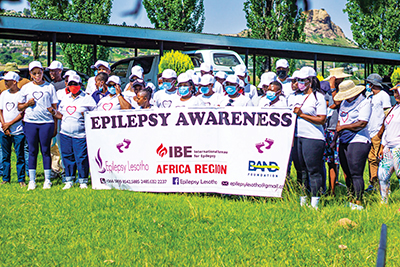By: Mpho Shelile
Epilepsy is one of the world’s oldest and known medical condition, the World Health Organization (WHO) describes epilepsy as a ‘chronic, non-communicable disorder of the brain that affects people of all ages.
Epilepsy is said to be one of the major brain disorders worldwide and should be considered a health priority in Africa. It is triggered by abnormal electrical activity in the brain resulting in an involuntary change in body movement, function, sensation, awareness and behaviour. The condition is characterized by repeated seizures or “fits” as they are commonly called. These take many forms ranging from the shortest lapse of attention to severe and frequent fits.
Misunderstanding, misinformation, and misperceptions about epilepsy and seizures, passed down through the centuries have resulted in stigma, negative attitudes and beliefs related to those living with the disorder, therefore resulting in social-distancing behaviors, social exclusion, and discrimination.
Yet, epilepsy continues to take its toll among people causing impaired physical, psychological and social functioning of those affected, and equally serious psychological, social and economic consequences for their families.
Worse still, people with epilepsy, sometimes along with their family members, are often stigmatized. This stigmatization generates a hidden burden which discourages patients from seeking the diagnosis and care they need and deserve. Another fallout of stigmatization is the discrimination, as people who experience seizures but are able to work are automatically deemed unfit for employment by society.
Yet in developing countries up to 90% of the people who have this condition, and sometimes even more, are excluded from care and consequently remain in the shadow of this treatment gap. One of the reasons for this is that in many parts of the world there is a grave social stigma attached to epilepsy. People believe that epilepsy is contagious and hesitate to assist or come into physical contact with those who incur seizure attack .The stigma of epilepsy also has a great influence on the education of children and young people.
Boitumelo a 29 year old epilepsy patient and survivor, when advocating for epilepsy stated that she has travelled quite a journey to get to where she is with her condition.
When asked about seizures, and what her coping mechanism is; she stated that she does experience frequent seizures and has had epilepsy her whole life. “Yes I experience seizures often and I am very much aware of the damage they cause to my brain no matter how mild they may seem. I get so tired, over stressed about the smallest things. I have learnt that there is nothing I can do to avoid them, but I have safe spots around town just in case I feel down when out with friends and family, that helps me cope.”
“I appreciate my family and friends, because they play a huge role in making sure that I am okay. I wear a fall SOS alarm so my parents know that I have gone down and I am not okay. I have midazolam if my seizures last more than 5 minutes and I am not breathing,” She said.
She further highlighted that epilepsy comes with a lot of risks, adding that she has had multiple broken arms from her falls when seizures take over, aspirated lungs from not being put on her left side properly. A wandering seizure where she fell and smashed her face on concrete and broke her ribs, stating that the doctors thought she had fractured her eye socket because of how bad her face was.
“I remember ending up with hypothermia from being on cold concrete floor for some time. It was night time, my parents found me out back in the morning. I was hospitalized and to try to control the seizures put in a coma just to give my brain rest.”
“I have talked to my neurologist about the possibility of surgery. They can see the scarring at the front of my brain and say it could be taken out. But I’m not sure I want to explore that channel as yet, unless my epilepsy gets worse. I try not to let it get to me or kill my morale. Epilepsy is not going to stop me from achieving my dreams. Speaking out about epilepsy is important to me. There are many people in sport who are living with the condition and just keeping quiet about it,” confessed Boitumelo.
She emphasized the love and the support she has from her family and friends, adding that when the going gets tough, she knows whom to rely on. “One thing about having a chronic illness is that you discover people’s true colors and to what extend they are willing to assist in critical situations. In one incident people and cars drove past while I lay in the middle of the road with no care or concern. That day I came to a conclusion that Basotho do not care about others.”
In Basotho culture epilepsy is oftentimes affiliated with witchcraft, and the general belief is that people with epilepsy are crazy and this stems from the fact that epilepsy medication is collected from Mohlomi hospital.
She expressed just how sometimes she wants to give up, adding that what keeps her going is the big wonderful family she has. Boitumelo indicated that one day she would like to take time for herself to mend and build a family of her own. Oftentimes she gets scared that her dream is too farfetched however she wishes to have a family of her own eventually. To all the people out there who are epileptic you are not alone, I am with you, I feel you, and I am sending my love and strength to you! Concluded Boitumelo.


